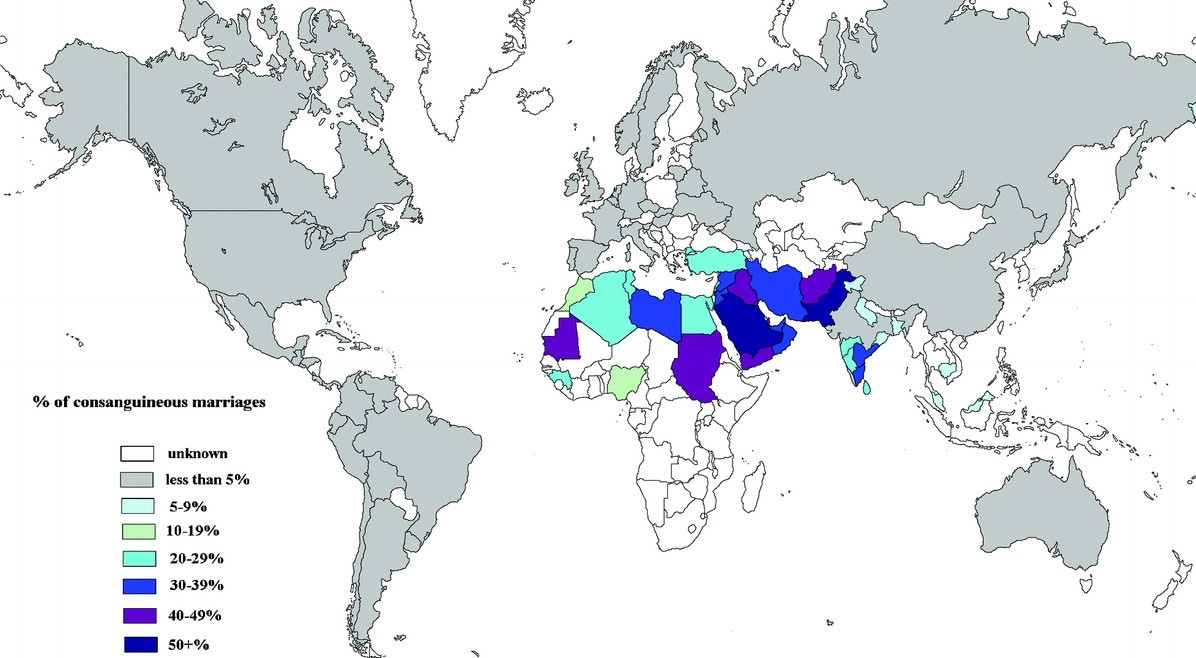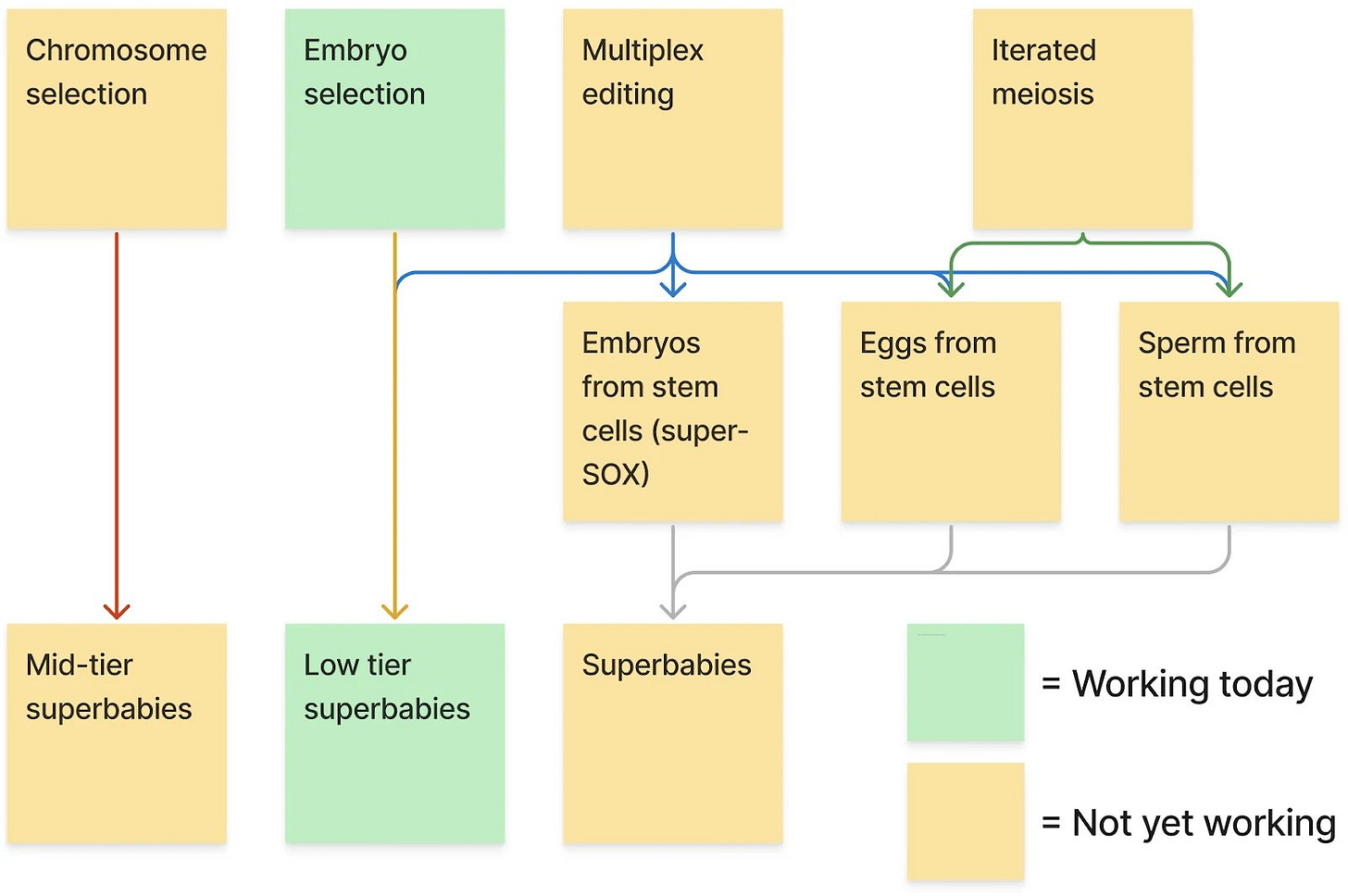Repronews #63: Should cousin marriage be banned?
LessWrong on “superbabies”; debating pronatalism; conservatives on immigration, families & IVF; atlas of functions of 20,000 human genes

Welcome to the latest issue of Repronews! Your regular newsletter was interrupted by my need to submit a research funding proposal for my PhD thesis. This required roaming across vast and diverse academic literatures to come up with a project that is both original and intelligible to existing fields. Thankfully the deed is done!
As one reader asked, you absolutely can send me stories / articles you think would be relevant for Repronews and our community of over 3000 subscribers and followers at craigjwilly[at]gmail[dot].com.
Highlights from this week’s edition:
Repro/genetics
LessWrong explores the technological prospects for “superbabies”
Population Policies & Trends
BBC discusses Born in Bradford study on health risks of cousin marriage, bans on cousin marriage in Norway and Sweden, and British debates
The Journal of Medical Ethics releases a pack of papers debating pronatalism
The Claremont Institute on immigration, family policy, and IVF
Genetic Studies
The Genetic Ontology Resource releases an “atlas” of the functions of 20,000 human genes
Further Learning
Repro/genetics
“How to make superbabies” (LessWrong)
Two users at LessWrong—philosopher Eliezer Yudkowski’s community blog, influential in Effective Altruism and AI ethics debates—have written up a detailed up-to-date account of how different reprotechnologies could foster genetic health and enhancement and what the current bottlenecks are.
The paper explores the possible impact on life expectancy, various diseases, and intelligence.
I can’t vouch for how realistic the technological proposals are or aren’t: I share to stimulate debate!
More on repro/genetics:
“Trump’s IVF order: one small step for the U.S., one giant leap for the GOP” (Evopolitics)
“Don’t celebrate Trump’s IVF order yet—here’s why” (PET)
“Australian IVF data breach after cyber-attack” (PET)
Denmark facilitates egg donation: A specific recipient no longer needed (PET)
“Judge’s sperm donor warning over man who ‘fathered 180 children’” (BBC)
“Savulescu’s Singapore Study: Survey finds Singaporeans mostly willing to use embryo selection to boost intelligence” (Evopolitics)
Population Policies & Trends
“Cousin marriage: What new evidence tells us about children’s ill health” (BBC)
The BBC discusses cousin marriage and associated birth defects, as revealed by the 18-year-old Born in Bradford study.
In Britain and other European countries, cousin marriage is coming under increased scrutiny, especially from doctors.
The Born in Bradford study is one of the biggest medical studies of its kind: between 2007 and 2010, researchers recruited more than 13,000 babies in the city and then followed them closely from childhood into early adulthood.
Over 1 in 6 children in the study have parents who are first cousins, mostly from Bradford’s Pakistani community, making the study particularly valuable to understand the health impacts of cousin marriage.
Blood-related parents may increase health risks for a child is through a recessive disorder, like cystic fibrosis or sickle cell disease.
A child of first cousins carries a 6% chance of inheriting a recessive disorder, compared to 3% for the general population.
The researchers found that first-cousin parentage may have wider consequences than previously thought. The Bradford study looked at dozens of data points, observing everything from children’s speech and language development to their performance at school. Mathematical modeling was used to try to eliminate the impacts of poverty and parental education to isolate the impact of consanguinity.
After factors like poverty were controlled for, a child of first cousins in Bradford had an 11% probability of being diagnosed with a speech and language problem, versus 7% for children whose parents are not related.
A child of first cousins was also found to have a 54% chance of reaching a “good stage of development” (a government assessment given to all five year-olds in England), versus 64% for children whose parents are not related.
Children of first cousins also had a third more primary care appointments than children of unrelated parents.
Neil Small, emeritus professor at the University of Bradford and the author of the study, said there was a “much wider distribution of excess healthcare usage in the consanguineous children” even accounting for those with recessive disorders.
Norway banned cousin marriage last year, while Sweden will do so next year. Health and non-coercive marriages are cited as reasons for the bans.
In Britain, the Conservative MP Richard Holden has introduced a bill to outlaw the practice. The Labour government says there are “no plans” to impose a ban.
At present, Britain is following the policy of “genetic counseling” whereby first-cousin couples are educated about the risks of having children and encouraged to get extra screening in pregnancy.
Amid concern about child health and strains on the National Health Service (NHS), some academics are asking whether genetic counseling needs to be strengthened with more funding and focused interventions.
By the twentieth century, the proportion of marriages between first cousins in Britain had fallen to about 1%, but the practice is fairly common among South Asians.
In three inner-city Bradford wards, 46% of mothers from the Pakistani community were married to a first or second cousin.
The public health argument is compelling for those who want to ban the practice. MP Holden defended the proposed ban on Talk TV, pointing to the higher risk of birth defects, infant mortality, and heart, brain, and kidney problems due to recessive disorders. He also explained that health effects can be “compounded” when the practice persists through generations.
Patrick Nash, a researcher and co-founder at the Pharos Foundation research institute, wants to see cousin marriage banned to prevent health risks. He argued for a ban in a paper in the Oxford Journal of Law and Religion. “Banning cousin marriage would improve public health drastically and have no negative health implications of its own,” he argued.
Professor Sam Oddie, a consultant neonatologist and researcher at Bradford Teaching Hospitals, has worked in Bradford for over 20 years and witnessed many cases of severe genetic disorders. “I’ve seen fatal skin conditions, fatal brain conditions, fatal muscle conditions,” he said, noting that it was “immediately clear” these conditions were occurring more in Bradford than elsewhere.
Oddie thinks the main risk to genetic health in Bradford is not cousin marriage per se, but endogamy, in which people marry members of their close community. Disease risk due to endogamy can also exist among Jewish communities, the Amish, and French Canadians.
“It’s often the case that the exact familial tie can’t be traced, but the gene occurs more commonly within a certain group, and for that reason, both parents carry the affected gene,” Oddie says.
Oddie wants to promote genetic literacy to address risk: raising awareness of genetic risks and how to prevent or manage them.
In the Born in Bradford study, the share of new mothers who were first cousins with the father fell from 39% in the late 2000s to 27% in the late 2010s.
Professor John Wright, chief investigator in the Born in Bradford project, suggests people are becoming more aware of the genetic risks and reacting accordingly.
In Norway, cousin marriage was also banned for being linked to the practice of forced marriage and “honor” violence.
Swedish Justice Secretary Gunnar Strömmer said his own country’s ban on cousin marriage will liberate women from “oppressive standards of honor.”
Nazir Afzal, former Chief Crown Prosecutor for the North West of England, said “thoughtful legislation” would “offer protections” to people coerced into cousin marriage. “[But] we must respect cultural diversity and personal choice,” he added. “Cousin marriage is an important cultural practice in many parts of the world and legislation should be sensitive to the social and familial values that underlie it.” He suggests governments may want to think about boosting education and genetic screening for couples entering cousin marriage rather than imposing blanket bans.
Karma Nirvana, a charity that works to end honor-based abuse, described the attempt to ban cousin marriage as “a tool of political point-scoring, inciting hate and driving a wedge between communities.”
The Journal of Medical Ethics debates pronatalism
The Journal of Medical Ethics has published a series of papers debating the ethics of pronatalism. Evidently a hot topic!
J.-Y., Lee, “Towards an ethics of pronatalism in South Korea (and beyond)” (JME): a critical feminist perspective arguing that pronatalism reifies oppressive patriarchal social norms and gender inequalities, without addressing the underlying causes of (ultra-)low fertility.
James Cordeiro, “On the difficulties of universalizing an ethics of state-sponsored pronatalism” (JME): Responding to Lee, argues criticism of pronatalism should be adapted to particular national contexts.
Joona Räsänen and Anna Smajdor, “Why not coercive pronatalism?” (JME): Responding to Lee, explores the ethics of coercive pronatalism by analogy with coercive military service, which exists in many countries.
Arnav Shandilya and Timothy Murphy, “States’ responsibilities regarding birth rates” (JME): Argues states have a legitimate interest in promoting fertility.
Junsik Yoon, “Antinatalist challenges to Korean pronatalism” (JME): Engages with antinatalist arguments that “it would be better not to be born.”
The Claremont Institute debates demographic trends
The Claremont Institute is a conservative Trump-friendly American think-tank historically founded by West-Coast Straussians.
Claremont has been putting out more demographic content.
Jason Richwine, “Immigration cannot solve the fertility crisis” (American Mind)
Cincinnatus series podcast: Family policy (American Mind): Discusses why “conservatives can no longer ignore the social aspects of family life” and “how states may empower parents to raise and school their children, boost fertility and attract young families, and close the class divide in marriage and family formation outcomes.”
Cincinnatus series podcast: IVF (American Mind): A critical discussion of IVF as “a moral dilemma as its processes discard embryos as a matter of course, ending more lives than even abortion.” The participants discuss this and other concerns surrounding IVF, namely genetic selection, the creation of human life for profit, the potential use of AI in dictating which embryos live, and more. They also raise solutions state legislatures can consider.
More on population policies and trends:
Jesús Fernández-Villaverde, “Rapid fertility decline is an existential crisis” (American Enterprise Institute)
“The baby boom in seven charts” (Our World in Data)
“Japanese city launches first-ever ‘marriage preparation’ housing aid, includes LGBTQ couples” (population.news)
Genetic Studies
“Atlas of the functions of 20,000 human genes published” (PET)
The functions of over 20,000 human genes are described in a new scientific database released by the Gene Ontology Resource.
The database details the function of over 20,000 human protein-
coding genes by combining data on human genes with genetic data from animals.
The database, known as the PAN-GO functionome, is publicly available for use.
“Our knowledge base allows scientists to go from just a list of genes to an understanding of their biological functions, including what might be useful for treatment,” said Professor Paul Thomas, a principal investigator of the Gene Ontology Consortium and lead author of the paper describing the database.
“By adding information about when each function arose in evolution, we’re now providing an even more complete, accurate, and concise description of the functions encoded by human genes,” Thomas said.
Currently, the database includes the function of 82% all protein-coding genes in the human genome. Functions of the remaining 18% have not yet been studied.
More on genetic studies:
“Greenlanders’ unique genetics, recent evolution & the health implications: More evidence for ‘recent, copious, and regional’ human evolution” (Evopolitics/Nature)
“Inherited cancer risk linked to single-nucleotide DNA differences” (PET)
Further Learning
“Making babies on Mars: Manifest destiny or manifest error?” (Roger Gosden)
“Men have grown twice as much as women over past century, study shows” (Guardian)
“The humble potato is undergoing a genetic revolution. Here’s how and what that means” (Undark/GLP)
Disclaimer: We cannot fact-check the linked-to stories and studies, nor do the views expressed necessarily reflect our own.





